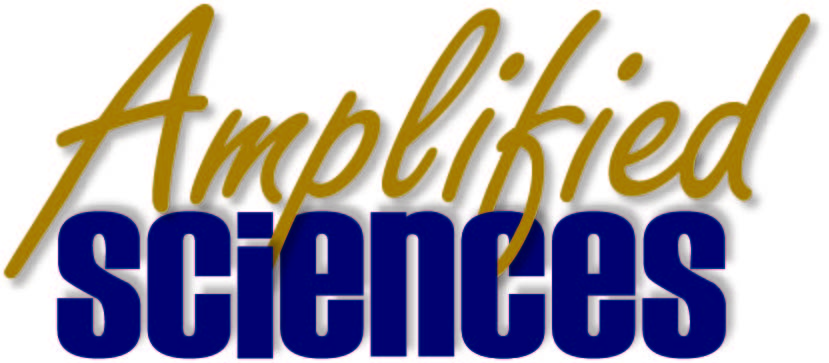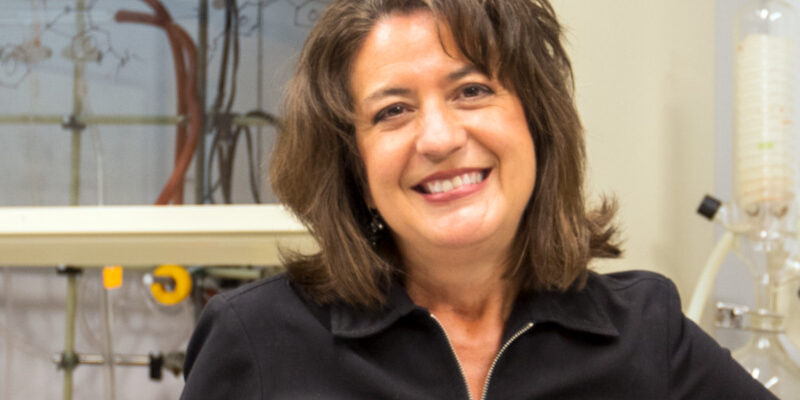I first met Diana Caldwell when she was the co-founder and CEO of Pearl Pathways. Pearl was among VisionTech’s corporate sponsors and an invaluable commercialization resource for our life sciences portfolio companies. It didn’t take long for Diana to become a member of VisionTech Angels, giving us deep bench strength as a subject matter expert in drug development and FDA regulatory paths. When she co-founded a new diagnostics startup with pancreatic cancer as its first target, Amplified Science, I was eager to learn more. Pancreatic cancer is the third most deadly cancer, killing 74 of 100 patients within a year of diagnosis, largely because it is rarely discovered early enough to treat successfully. I invited Diana to meet with the VisionTech Angels Screening Committee earlier this month. The group was impressed with Amplified Sciences, its novel technology, progress to date, and invited her to present at our April 27 virtual pitch events. Here’s a preview.
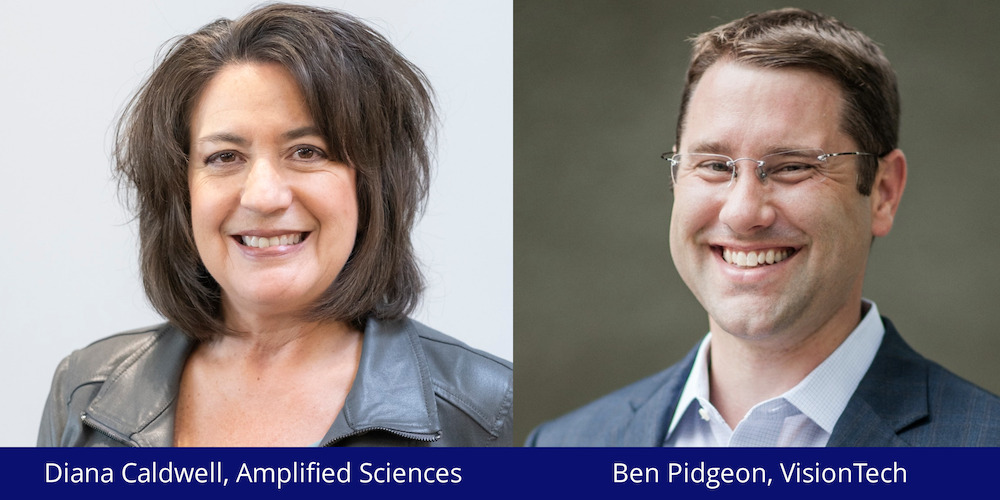
BP: Tell me a little about yourself. Is this your first startup?
DC: This is actually my second startup. I was also a co-founder of Pearl Pathways. After earning an MBA at the IU Kelley School of Business, I joined Lilly where I held commercial and cross functional roles for the next 16 years. Lilly really gave me a broad foundation of experience in leadership and developing teams in the biotech space. Eventually, a desire to be an entrepreneur and get back into product development for unmet clinical needs brought me to the startup space.
BP: What’s the backstory on Amplified Sciences? How did you connect with your co-founder, Dr. V. Jo Davisson?
DC: I was working at the Purdue Foundry as an entrepreneur-in-resident, helping a half a dozen startups and shopping for IP for my next startup. While I was there, I met Jo, a Purdue faculty member and biochemist with 30 years of experience in drug and diagnostic discovery and development. He had invented a chemistry reagent platform for the early detection of debilitating diseases, had founded the company, and was looking for a CEO with deep business experience. For the next nine months we had the opportunity to work alongside each other—Purdue has this great knack of pairing entrepreneurs with scientists! In the summer of 2019, I became a co-founder and CEO with Jo as our CSO, and we got to work.
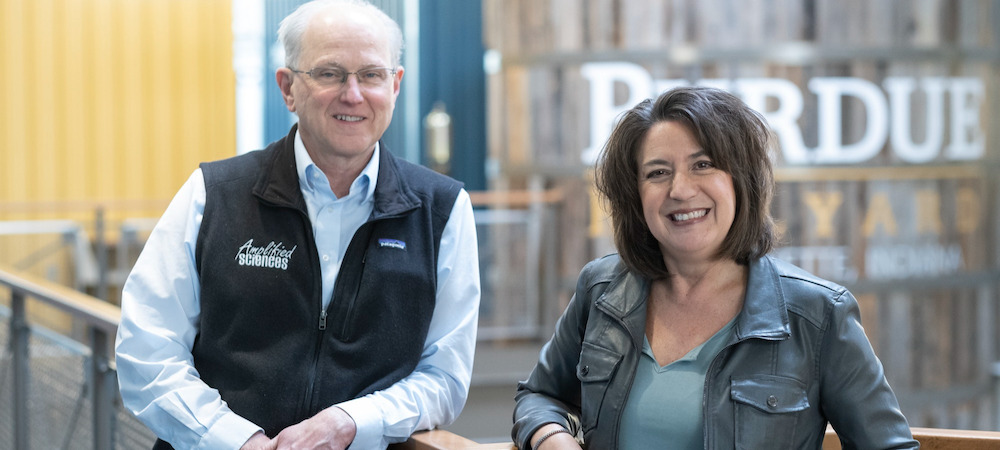
BP: What is your product and how is it different?
DC: Our lead product is a diagnostic reagent for accurately detecting a biomarker that is an indicator of potential malignancy for pancreatic cancer. Amplified Sciences’ chemistry reagent platform is a suite of patented reporter dyes that amplify biomarker signals. What’s novel about our technology is the ability to detect indicators of disease at a much lower concentration – up to 10,000 times improved limits of detection – than comparable technologies. Our ultrasensitive dye probes work particularly well when there is a low abundance of the target biomarker and when there is a low volume sample involved. These features are important when you’re working with low volume samples such as with a cyst or when a disease is in its very early stages.
BP: Let’s discuss your lead assay, PanCystProTM. Why pancreatic cancer? Where are you in its development?
DC: We chose pancreatic cancer for our lead assay for several reasons. First, because of the deadly nature of the disease—roughly three out of four patients are dead within a year of diagnosis—and the unmet medical need for early-stage diagnostics to help increase survival rates. Pancreatic cancer is a “silent cancer” in that symptoms don’t show up until late stage if they show up at all. By then it’s too late to treat effectively. Early detection is the only way to significantly change outcomes.
Here’s an example for you. Supreme Court Justice Ruth Bader Ginsburg had colon cancer. It was caught early, and she survived. Later, when she was undergoing a full body scan, an early-stage cyst was found on her pancreas. She was treated with a surgical removal of that cyst, and survived for years. It was only by chance that her pancreatic cancer was found when still treatable.
Why is it so hard to find? For one thing, the pancreas is deep within the body, behind the stomach, so it’s hard to see in imaging. Most of these cysts are found by imaging incidentally meaning they are found in a cat scan or MRI when doctors are looking for something else .
Our PanCystPro™ assays test the fluid from these cysts, which are very small so fluid sample sizes are small. This works in our favor because of the ability of our technology to operate with very small sample volumes. Our initial PanCystPro assay is a minimal sample assay for protease biomarkers and is a “rule out” test to determine if the cyst is benign. At +90% sensitivity and specificity, it is more accurate than competing tests.
We have additional assays in this disease state in development. I’d also like to mention that we were just awarded a Phase 1 SBIR grant of $400,000 from the National Cancer Institute. This will help accelerate development of our second assay for pancreatic cancer. The award validates the huge clinical need for this test.
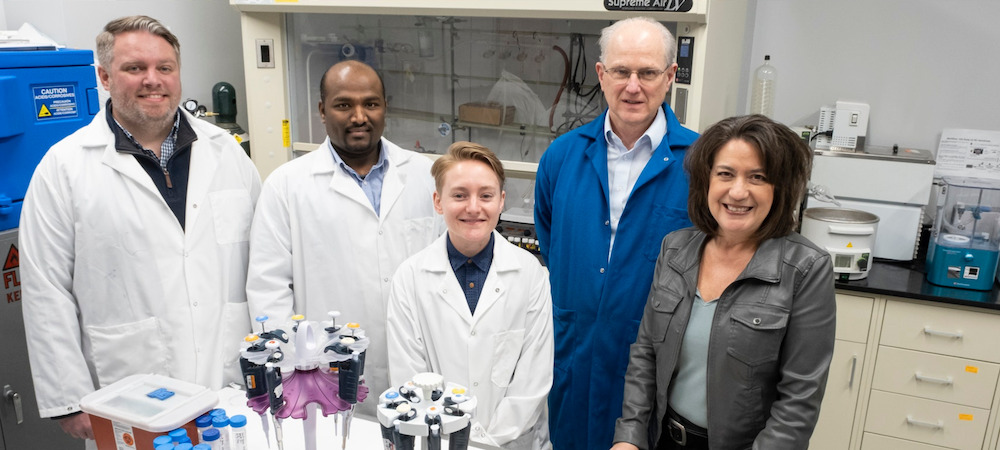
BP: Where are you in development?
DC: We are making steady progress. The PanCystPro test has been used in clinical samples and is ready for translation to a clinical lab and to enter the regulatory process. Our team, which includes three Ph.D. scientists, is set to expand soon. Research and development on additional assays are underway and this includes active institutional review board (IRBs) studies with three premier research universities.
BP: What is your total addressable market?
DC: The in-vitro diagnostics market is huge, about $88 billion. For initial market entry, we are focusing on the pancreatic cancer diagnostic market, which is $2.2 billion including imaging. Drilling down to our real value proposition, more accurate diagnosis of patients with pancreatic cysts, the market is $300 million with a potential market share of $80 million. Pancreatic cancer in-vitro diagnostics is just the start so keep in mind, this is a platform technology that will be leveraged to other disease states.
BP: What kind of intellectual property protection do you have?
DC: We have a suite of global composition of matter patents exclusively licensed from Purdue. We are adding patents on our individual products.
BP: What round is this?
DC: This is our Series Seed Preferred Round. We completed a previous Series Seed convertible note round in early 2021, raising $1.78 million. In this round, our goal is to raise $3-3.5 million. We have two co-leads, Elevate Ventures and OCA Ventures, that have done their due diligence. They, alongside two other venture firms, closed $1.5 million in Wave 1 of the open round on March 3, 2023. We’d like to raise another $1.5 to $2 million so there’s still plenty of room for VisionTech Angels.
BP: What is your planned use of funds?
DC: The largest portion will be directed to research and development on two additional assays, followed by CLIA regulatory approval, targeted launch with key opinion leaders, clinical utility and trials, sales and marketing, and capital equipment.
BP: Give me three reasons why VisionTech Angels members should invest.
DC: First, this is an opportunity to help us build a great diagnostics company focused on earlier, mor accurate detection starting with pancreatic cancer. Second, others believe we are up to the challenge. We already have two respected investors leading the round, Elevate Ventures and OCA Ventures, both of which have invested in diagnostics companies in the past and are familiar with the space. Third, we are a clinical stage company making measurable progress and are planning our commercial launch by end of year. I’m going to sneak in a fourth: we have identified multiple paths to exit and are working hard on the milestones needed for a near term exit.
VisionTech Angels’ April Pitch Events will be virtual on Thursday, April 27 at Noon and at 6 p.m. ET. Pitch events are open to our members and accredited investors interested in joining our group. To register, check your email for an invitation, go to our Events page where you’ll find the RSVP links, or email Ben Pidgeon at bpidgeon@visiontech-partners.com
